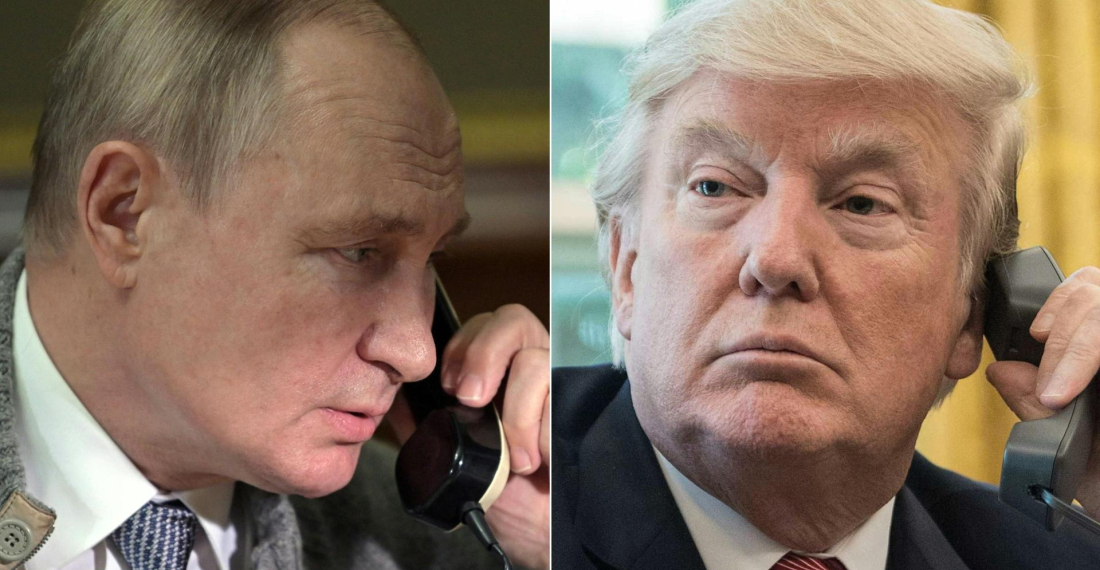Donald Trump and Vladimir Putin agreed Tuesday on a halt in Russian attacks against Ukrainian energy targets but fell far short of securing a full ceasefire in a highly anticipated phone call. The US and Russian leaders spoke for more than an hour and a half and both expressed hopes for repairing relations between the countries. However, there was no agreement from the Russian president for Washington's proposed full 30-day ceasefire in Russia's invasion of its pro-Western neighbour.
The Kremlin said Putin agreed to pause strikes on Ukraine energy targets for 30 days and that Putin had already given the order to his military. The White House said separately that the "leaders agreed that the movement to peace will begin with an energy and infrastructure ceasefire."
Russia has launched a series of devastating attacks on Ukraine's energy infrastructure throughout the three-year-old war. According to the Kremlin statement, Ukraine, which has bombed multiple Russian oil installations, had also agreed to the truce on energy targets, although Kyiv had yet to comment.
The two leaders agreed that broader truce talks would "begin immediately in the Middle East," the White House said in its statement, also citing a "huge upside" if Russia and the United States improve their relations. But the Kremlin statement said a "key condition" for peace would be ending Western military and intelligence support to Ukraine's embattled military, a position that will alarm Kyiv and European capitals that have already accused Putin of stalling.
Trump had already made clear before the call that he was ready to discuss "dividing up certain assets", what parts of occupied Ukraine that Russia would be allowed to keep. The US president had said on his Truth Social network on the eve of the call that "many elements of a final agreement have been agreed to, but much remains" to be settled. US allies, alarmed by Trump's recent pivot towards Russia, fear the Republican will give too much ground to the Russian president, a leader for whom he has repeatedly expressed admiration.
Kyiv had already agreed to the US proposal to halt fighting for 30 days. It said on Tuesday before the call that it expected Moscow to "unconditionally" accept to the ceasefire." It is time for Russia to show whether it really wants peace," Ukraine's Foreign Minister Andriy Sybiga said.
But Putin has repeatedly said that there were further issues that needed discussion, which Tuesday's call apparently failed to fully resolve. Putin gave a hardline anti-Western speech Tuesday before the call, saying the West would still try to undermine Russia even if it lifted sanctions imposed over its invasion of Ukraine. He mocked the G7 group of rich democracies, from which Russia was expelled in 2018, to wild applause from the audience, saying it was too small to "see on a map."
Ukrainian President Volodymyr Zelensky has warned Putin does not want peace and is trying to achieve a better position militarily ahead of any halt in fighting. Russia has attacked Ukraine with near daily barrages of drones and missiles for more than three years, occupying some 20 percent southern and eastern Ukraine and pressing a grinding advance in recent months.
The Kremlin has also hailed Moscow's quick offensive in the Kursk region, parts of which Ukraine seized last year and was hoping to use as a bargaining chip. The push towards a ceasefire began in February when Trump announced that he had spoken to Putin, a surprise call that broke Western efforts to isolate the Russian leader while his invasion continues.
As Trump upended years of US policy he then had a televised shouting match with Zelensky in the Oval Office on February 28, which led to the United States temporarily suspending its billions of dollars in military aid to Kyiv. On Sunday Trump said he would discuss issues of "land" and "power plants" with Putin, a likely reference to the Moscow-occupied Zaporizhzhia nuclear plant.
Trump is however intent on delivering on an election pledge to end fighting in Ukraine, blaming his predecessor Joe Biden's policy on Russia for fueling the war. "It must end NOW," he said on Truth Social.






